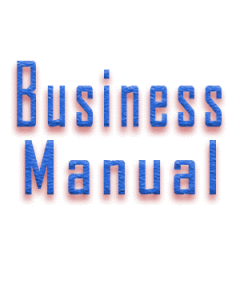A business is comprised of several moving parts. In a small business, all the moving parts are usually filled by one or a few people who memorize their roles and duties. As a business grows the moving parts increase and the people holding these positions also increase. When a new employees comes in, the process of getting them up to speed gets more and more complicated. To reduce confusion and improve the learning curve of employees you should employ job manuals.
 The purpose of a job manual is to automate the learning process especially for new employees. Every part of the business is described in full detail;
The purpose of a job manual is to automate the learning process especially for new employees. Every part of the business is described in full detail;
• What the position does
• What output is expected
• How to perform each specific task
• The exact standard of the expected results
• What to do in case of any problem
• How to report to the next level of management
Benefits of job manuals
Job manuals have several benefits to a business that makes use of them;
1. Job manuals eliminate guess work and improvisation in the work process to ensure a consistent standard of output.
Customers and clients of a business expect certain standards of quality in the results that they receive. When this standard keeps changing, it gives an inconsistent feel to your product feel or service and it’s not uncommon to lose almost all customers you gain over time.
2. Job manuals improve the learning curve of new employees to a new position in the business.
For a new employee, just knowing what they are supposed to be doing can be a hurdle. Since so much time is wasted in describing what they are supposed to be doing, a lot more time is wasted in showing them how to do it. A job manual is a descriptive document a new employee can immediately dig into and start working and only pause to ask for clarification on a few issues.
3. They save the time of other employees who would have been brought in to bring the new employees up to speed.
Having to train new employees is a nerve racking experience especially when the trainer has their own duties to worry about. This can lead to insufficient or wrong advice or to the slowing down of duties to both positions.
4. They help make key employees replaceable giving back control to the owner and manager of the business.
An untold number of business owners gave up control of their business a long time ago. They now have to contend to things getting done in the wrong way or, worse than they would have them done. All this because they have no way of firing the key personnel. They feel that if they fired the poor performers, they would have no way to get new staff up to speed on how the job is done.
Job manuals are blueprints that any new employee can follow and they transfer power and knowledge from individuals to positions making poor performers replaceable.
5. They stand in for the owner or manager when they are away.
The employee has the manual to remind them of what they are supposed to do and how to measure it.
It is not uncommon to find a business in disarray when the owner is away all because the employees claim they have no idea what they should be doing.
Most business rely on a boss to come in and tell them what to do. A job manual eliminates this need.
6. Job Manuals are easy to create.
Most business owners do agree that job manuals are important; however, very few ever embark on the process of creating them.
This is due to the assumption that creating job manuals is a long and complicated process; it’s not. All you need is to observe a task and note down the best way to do it. You can have every position in the business do this and simply go over what is noted down and approve or disapprove. If you approve, you simply bind all the pages together and you have yourself a job manual. Now make copies for everyone and ensure they are read and updated.
While job manuals are typically assumed to work in large organizations with many positions, they should also be implemented in smaller business with fewer employees to help organize the business, improve on the consistency of output and place power on positions rather than persons.
